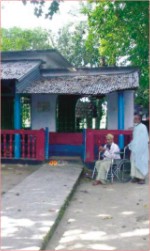Journey through Bangldesh
From Jhenidah
Memories of Gazi, Kalu and Champabati at Barobazar Azibor Rahman
When one strolls down Barobazar, whether one is a devotee or not, one can find historical interest at the gravesite of Gazi, Kalu and Champabati. The more fervent among the devotees assemble here every year. The place gets pretty crowded and has to withstand a lot of wear and tear. Many feel that better efforts should be made to preserve this historical landmark.

A few miles off of Jhenidah, occupying a great piece of land, lays the dargah of Gazi. It is here that one can find the final resting places of Hazrat Shah Gazi the great lover, Kalu and Champabati. The legend of Gazi and Kalu is well known. Shah Sekandar Ali of the Kingdom of Bayrat in Sylhet, with his wife Ajufa Shundari, had two children-- the son Gazi and the adopted son Kalu.
 One day, around the riverbanks, the family saw a boat-like four-cornered iron safe. Beside the safe, unaccompanied, was a lovely child. So, with the permission of his wife, Sekandar brought the child home. They named the boy Kalu. Some days later Azufa Shundari gave birth to her second son. He was named Shah Gazi. Gazi and Kalu became great friends and were always faithful and loyal to one another. Gazi, however, was indifferent towards the mundane things of domestic life. One day Gazi and Kalu went off to the Sundarbans to meditate together, without anyone's knowledge. After meditating for a long time, Gazi made an astana at the village of Badurgacha, near Barobazar. After staying there for a few days, the brothers set out for Bairat Nagor. After reaching Brahmin Nagor (presently Mallikpur) on the way, Gazi caught a glimpse of the exquisite Champabati at the banks of the river. They exchanged glances. Champabati turned out to be the daughter of the king Mukut. Gazi, in love, finally proposed marriage. One day, around the riverbanks, the family saw a boat-like four-cornered iron safe. Beside the safe, unaccompanied, was a lovely child. So, with the permission of his wife, Sekandar brought the child home. They named the boy Kalu. Some days later Azufa Shundari gave birth to her second son. He was named Shah Gazi. Gazi and Kalu became great friends and were always faithful and loyal to one another. Gazi, however, was indifferent towards the mundane things of domestic life. One day Gazi and Kalu went off to the Sundarbans to meditate together, without anyone's knowledge. After meditating for a long time, Gazi made an astana at the village of Badurgacha, near Barobazar. After staying there for a few days, the brothers set out for Bairat Nagor. After reaching Brahmin Nagor (presently Mallikpur) on the way, Gazi caught a glimpse of the exquisite Champabati at the banks of the river. They exchanged glances. Champabati turned out to be the daughter of the king Mukut. Gazi, in love, finally proposed marriage.
The king not only rejected the offer but also decided to punish Gazi by crushing him with stone. Needless to say, Gazi was not pleased upon hearing this. Finding no alternative to fighting with the king he decided that he needed the help of other kings. Events progressed, and soon there were bloody fights and at one stage all the members of the royal family got killed except Champabati. Gazi triumphantly married Champabati.
In subsequent days Champabati attended meditation with Gazi and Kalu. Today their memories can be recalled by visiting the gravesite where all three of them lie. About seven hundred years ago, “Allahu Akbar” was engraved on the tombstones. To this date the last Thursday of every Phalgun month is celebrated here. Thanks to the District Commissioner of Jhenidah, some parts of site have been preserved with his funding. The story of Gazi, Kalu and Champabati is another part of our history worth remembering.
Copyright
(R) thedailystar.net 2007
|
|
